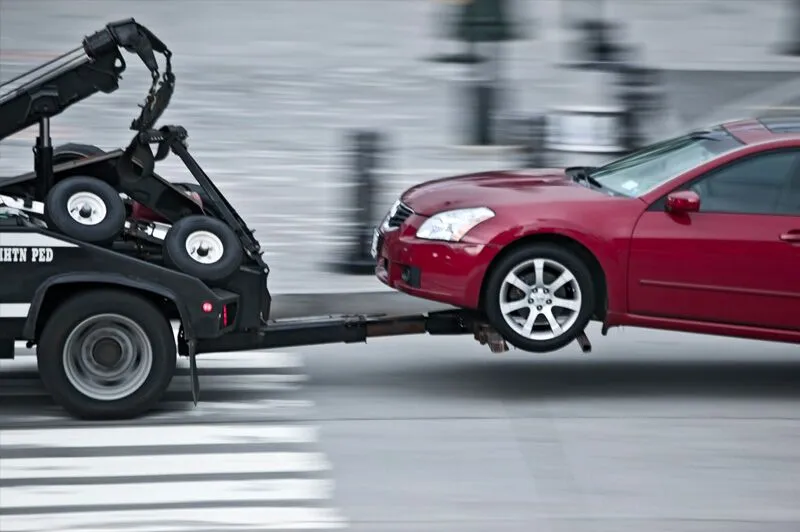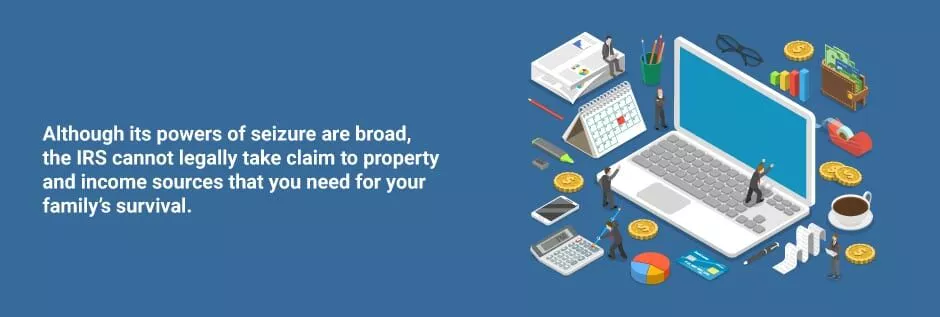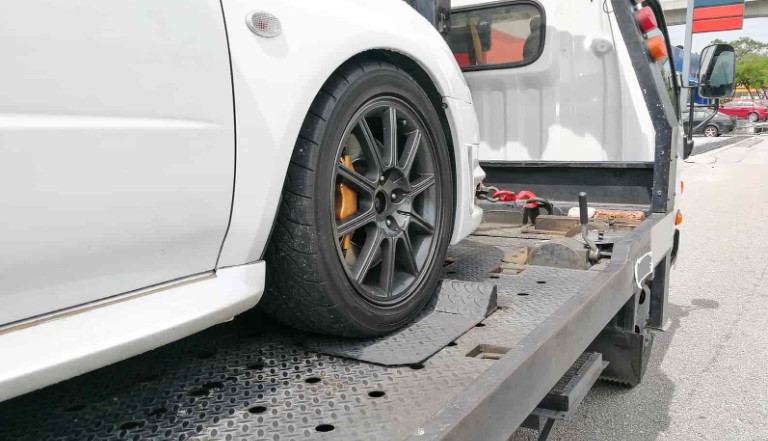Yes, the IRS can take your car for back taxes. This is known as a levy and it allows the government to seize property owned by taxpayers who owe money to the IRS. The amount of money owed must exceed $5,000 before the levy can be enforced, but if that threshold is met, then any vehicle registered in your name becomes fair game for seizure.
In order to avoid having your car taken away, you need to pay it off or negotiate an installment agreement with the IRS to settle your debt. If that fails, then filing bankruptcy might be one of the few remaining options available.
In this guide, we will answer the question, “Can the IRS Take My Car for Back Taxes?” and everything related to it. So, stay tuned.

Can the IRS Take My Car for Back taxes? Back Tax Issues Explained!
The Internal Revenue Service (IRS) can take your car for back taxes if you owe a substantial amount of money. The IRS is able to seize any type of vehicle, including cars, boats, motorcycles, and recreational vehicles. Once the IRS has taken possession of your car, they will sell it at an auction in order to recoup some or all of what you owe them.
As this is a serious matter that could have long-term consequences for your financial situation, it is important that you contact the IRS as soon as possible if you believe there may be any tax issues surrounding your vehicle ownership.
Can the IRS Take Your House And Car for Back Taxes?
Yes, the IRS can take your house and car for back taxes. The process is called a “levy” or “seizure.” In order to take your house or car, the IRS must first assess you with a tax liability and then send you an official notice of intent to levy.
After the 30-day period from the date of that notice has passed, they may proceed with seizing those assets in order to satisfy any unpaid liabilities. However, even if they do seize these assets, there are certain exemptions under which some of them may be deemed untouchable by the government.
It’s important to consult a qualified tax attorney who can advise you on how best to protect yourself from potential levies.

When Can the IRS Take Your Car?
The IRS can take your car if you owe back taxes, penalties, and interest that total more than $5,000. If the IRS has issued a Notice of Intent to Levy and Notice of Your Right to A Hearing, then they are allowed to seize your car as well as other assets such as bank accounts or real estate.
The seizure is usually done without warning, but the notice will be sent prior to any action taken by the IRS.
The seized property will then be sold at auction, with proceeds going towards satisfying your debt.
What Assets Cannot Be Seized by the IRS?
Generally speaking, assets that are exempt from seizure by the IRS include 401(k)s and other retirement accounts. Items of minimal value, such as:
- Clothing and furniture,
- Life insurance policies with a cash surrender value under $1,200 (or any amount if used to pay funeral expenses),
- Tools of trade up to a certain value, homestead property in some states up to a certain dollar amount or acreage limit,
- Vehicles necessary for transportation of self or family members up to certain values, public benefits such as Social Security payments or unemployment compensation.
Additionally, any asset held jointly between spouses cannot be seized by the IRS unless both parties are liable for the debt owed.

Can the IRS Put a Lien on Your Vehicle?
Yes, the IRS can put a lien on your vehicle if you owe back taxes. A tax lien is the government’s legal claim against your property when you fail to pay your taxes.
The IRS can file a Notice of Federal Tax Lien that serves as public record, which will make it harder for you to borrow money or sell any of your assets until the debt is paid off.
The IRS may also seize and sell your car or other personal property in order to satisfy the debt.
How Often Does the IRS Seize Cars?
The IRS has the ability to seize cars if a taxpayer fails to pay their taxes, and they do so on an as-needed basis. However, it is not something that happens frequently. The IRS will usually first attempt other methods of collecting the debt before resorting to a car seizure.
This includes sending notices, filing liens against assets, and garnishing wages. If all else fails, then the IRS may choose to seize and sell a vehicle owned by the taxpayer in order to collect what is owed.
Can the IRS Take Your Car If You Don’t Own It?
No, the IRS cannot take your car if you don’t own it. If the owner of a vehicle owes taxes to the IRS and fails to pay them, then the IRS can place a lien on that person’s property. This means that if they ever sell their property (including their car), then any proceeds must be used to first satisfy the tax debt owed.
However, in order for this process to work correctly, an individual needs to actually own the car or other piece of property in order for a lien to be placed against it.
Can the IRS Make You Homeless?
No, the IRS cannot make you homeless. The IRS can garnish your wages or seize assets to pay off a tax debt, but they cannot take away your home unless you owe back taxes on that property.
It is important to stay in communication with the IRS so that an agreement can be made about how to repay any outstanding debts.
Failing to do so could lead to legal action and potential wage garnishment or asset seizure.

Can the IRS Take Money from My Bank Account Without Notice?
The IRS is legally allowed to take money from your bank account without prior notice in certain situations. This is called a levy, and the IRS can use this process to collect unpaid taxes when other methods have failed.
Generally, before taking such action, the IRS will attempt to contact you by mail or phone several times, but they are not required to provide advance warning before initiating a levy on your account.
IRS Levy Release Phone Number
If you need assistance with the release of an IRS levy, the IRS Levy Release Phone Number is 1-800-829-7650. This number can be used to speak with a representative who can provide information on how to get your levy released.
Additionally, this number can also be used for general inquiries about other topics related to taxes and levies.
Can the IRS Take Your Leased Car?
Yes, the IRS can take your leased car if you are unable to pay your taxes. The IRS has the right to levy any property that you own in order to satisfy a tax debt. This means that they can seize and sell assets such as real estate, cars, bank accounts or other items of value.
If your lease is still active at the time of seizure, then the IRS will work with the leasing company in order to repossess it on their behalf.

Can the IRS Put a Lien on Your Car?
Yes, the IRS can put a lien on your car if you owe back taxes. A tax lien is essentially a legal claim against your property, including any vehicles you own. This means that if you have unpaid federal income taxes and fail to make arrangements with the IRS to pay them off, they can seize your vehicle until the debt is settled.
IRS Levy Causing Hardship
The IRS levy is a powerful collection tool used by the Internal Revenue Service to collect unpaid taxes. It’s an aggressive way of collecting back taxes and can cause serious financial hardship for taxpayers who are unable to pay their debt in full. The IRS can seize assets, including bank accounts, wages, social security benefits, and more.
If your financial situation has become dire due to the IRS levy, it is important that you act quickly and contact a tax professional or attorney. They can help you negotiate with the IRS for relief from the levy or other payment arrangements that may be available.
I Have a Tax Lien. Will the IRS Seize My House or My Car?
Can the IRS seize a financed car?
Yes, the Internal Revenue Service (IRS) has the authority to seize a financed car if you have unpaid tax debts. If you owe back taxes and have not made arrangements to pay them, the IRS can take various collection actions to satisfy the debt, and one of these actions may involve seizing your assets, including your car.
Conclusion
In conclusion, it is possible for the IRS to take your car if you owe back taxes. It’s essential to be aware of the potential consequences of not paying your taxes and how serious the government can be about collecting them.
If you are having trouble making payments, seek help from a tax professional before it’s too late – they may be able to provide solutions that can prevent your car or other assets from being seized by the IRS.
